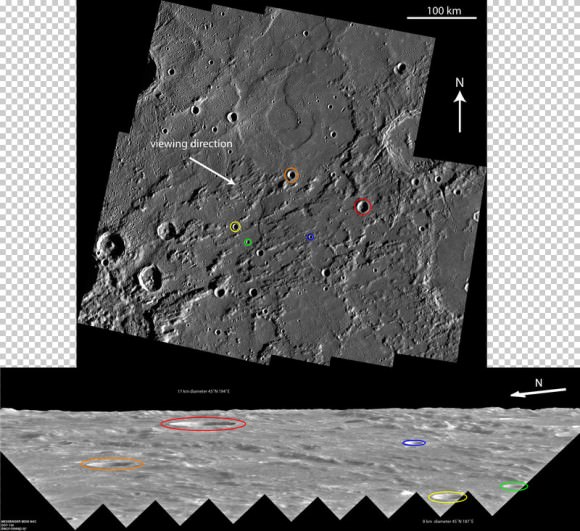[/caption]
Wow — just wow! Here’s a unique, jaw-dropping, and beautiful look at Mercury from the MESSENGER spacecraft, in a mosaic created from nine images taken by the Narrow Angle Camera (NAC) of the Mercury Dual Imaging System (MDIS). The camera took a “sideways” or oblique view of Mercury’s limb, looking towards the horizon, providing a distinctive look at the rough terrain, ridges, craters and scarps of the Van Eyck Formation region, adjacent to the Caloris basin. Combining the images for a larger view not only provides a “you are there” feel, but it provides the science team with new ways to study Mercury’s geology.
Make sure you click on the image for a larger, even more amazing view. You can compare this image with a “straight-down” look of the same region, below.

Looking at any landscape in from different angles has a major impact on how terrain location and feature orientation is perceived, the MESSENGER science team explained in a detailed description of how this image was made. While single images that focus on one feature are wonderful for in-depth explorations, combining images together in a mosaic studying can provide regional or even global perspective. These mosaics are particularly important for understanding the geological context of a particular feature and for exploring Mercury’s geologic history.
The Van Eyck region was formed by ejecta from the Caloris basin. Visible in the overhead view are “ghost craters” which are impact craters that were later buried by the voluminous volcanic lavas that form the plains in this part of Mercury. What appear as rough terrain and ridges in the oblique limb view show up as lineated, distinctive features from overhead. Both views provide clues to scientists about the processes or environment that the features formed.
The ejecta blanket of Caloris basin is to the lower left of the overhead-view.
The limb mosaic is just 9 of 75,000 images the NAC has taken and will continue to take during MESSENGER’s primary mission, which goes through March of 2012. These images were taken in June of 2011, and the mosaic was released today by the imaging team.
Source: MESSENGER
Hat tip: Stu Atkinson


I subscribe to the Messenger RSS feed and I generally look at every image. Suffice it to say most of the time they are a bit boring (I am sorry that is how I feel). this image however is far from it. Good work!
That’s probably the point of taking the picture! Pretty pictures! I think MGS also did something like that for Mars =P
(edit: The MESSENGER science team’s link isn’t working)
Thanks — its now been fixed!
the truth is that it is amazing how we can see from the ground surface of Mercury … and at such high quality! Thank you and congratulations for your work …
I don’t understand use of the word limb in this context. Is it an Americanism or have I just lived a sheltered life?
It’s a pretty old fashioned word, but still commonly used (especially when describing the edge of the Moon) in astronomy. It’s the visible edge of the Sun, Moon or a planet.
From the Latin limbus=border.
Yo Steve, see Oxford Dictionaries definition of limb (sense 2; section 1).
Got it – thanks
Got it – thanks
Well, I don’t know if “wow, unique, jaw-dropping and beautiful”, but definitely a cool angle.